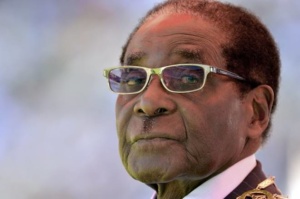President Robert Mugabe of Zimbabwean has offered his resignation with immediate effect.

Mr Mugabe’s resignation letter was read out in the country’s parliament, where impeachment proceedings against him had begun.
Celebrations broke out as the speaker read where Mr Mugabe said he had chosen to step down “to allow the smooth transfer of power” and made the decision voluntarily.
Zimbabwe has been under the control of the military for some days after its army chief warned President Robert Mugabe against purging the ruling party’s senior ranks and kept him under close watch.
Analysts say it appears to be the climax of a power struggle between liberation-era figures loyal to ousted vice president Emmerson Mnangagwa and forces faithful to First Lady Grace Mugabe, who is seen as vying to succeed her 93-year-old husband.
Here is what we know:
Armoured personnel carriers and troops were deployed onto roads leading towards Harare on Tuesday, November 14, a day after army chief General Constantino Chiwenga warned the military may intervene after Mugabe fired Mnangagwa last week.
Mnangagwa was popular with security forces but had repeatedly clashed with Grace, 52, a political novice who is believed to have alarmed many senior army commanders with her open posturing and ambition.
It became clear after nightfall that the manoeuvres were not routine when the armoured vehicles took up positions outside key sites of power in the capital.
Shortly afterwards, a senior army officer, flanked by an air force commander, made a late-night address on the ZBC state broadcaster after having apparently taken over the station’s output.
They denied staging a coup, saying they were targeting “criminals” close to the president. Initial reports suggest key Grace ally and leader of the ruling ZANU-PF party youth league Kudzai Chipanga is among those detained.
During the late-night broadcast, the two uniformed commanders insisted that Mugabe was not under arrest.
“We wish to assure the nation that his Excellency the president… and his family are safe and sound and their security is guaranteed,” Major General Sibusiso Moyo said, reading out a prepared statement.
“We are only targeting criminals around him… this is not a military takeover of government.”
The First Family have not been seen since the start of the unrest and prolonged gunfire was heard near Mugabe’s private residence in the early hours of Wednesday morning.
The South African government said on Wednesday that President Jacob Zuma had spoken to Mugabe who confirmed that he was “confined to his home” — but otherwise fine.
President of regional heavyweight South Africa Jacob Zuma issued a statement calling for Zimbabwe to avoid “unconstitutional changes of government” and “urged the Zimbabwean Defence Force to ensure the maintenance of peace and security”.
Pretoria also announced it was sending its defence and intelligence ministers to Zimbabwe on behalf of the southern African regional bloc to meet army chiefs and Mugabe.
The European Union called on “all the relevant players to move from confrontation to dialogue.”
The United States said its embassy would be closed to the public on Wednesday and called on its citizens in the country to “shelter in place”.
Britain issued a special travel alert to call on its citizens to “avoid political activity”, warning “the authorities have sometimes used force to suppress demonstrations”.
The army’s dramatic seizure of power from the ailing liberation leader turned autocrat has stunned the nation and plunged it into uncertainty.
Mnangagwa has reportedly left South Africa by plane. If so, it could be that he may return to Zimbabwe to try to broker a resolution.
However, South Africa’s warning — together with its dispatch of envoys — could complicate any efforts to hand power to an unelected civilian caretaker government.
An extraordinary meeting of the ruling ZANU-PF party intended to smooth party divisions was scheduled for next month but this has now been thrown into doubt. (AFP)
Kindly follow us on twitter:@AfricanVoice2









